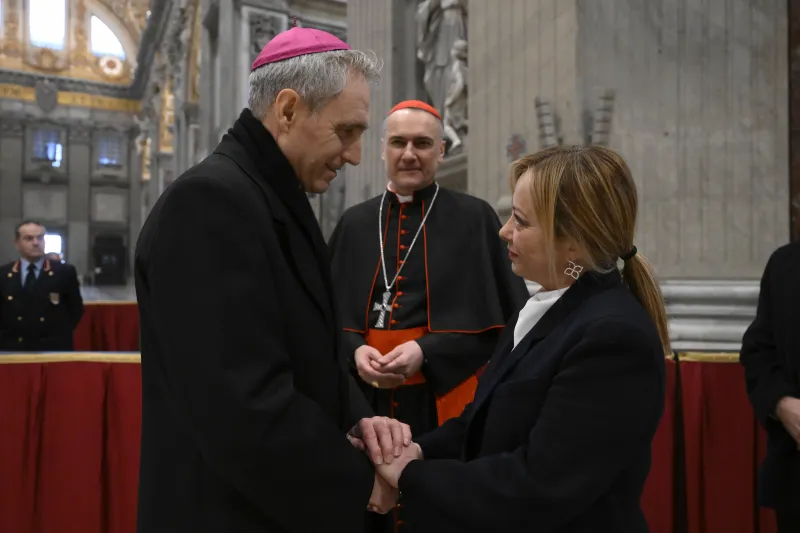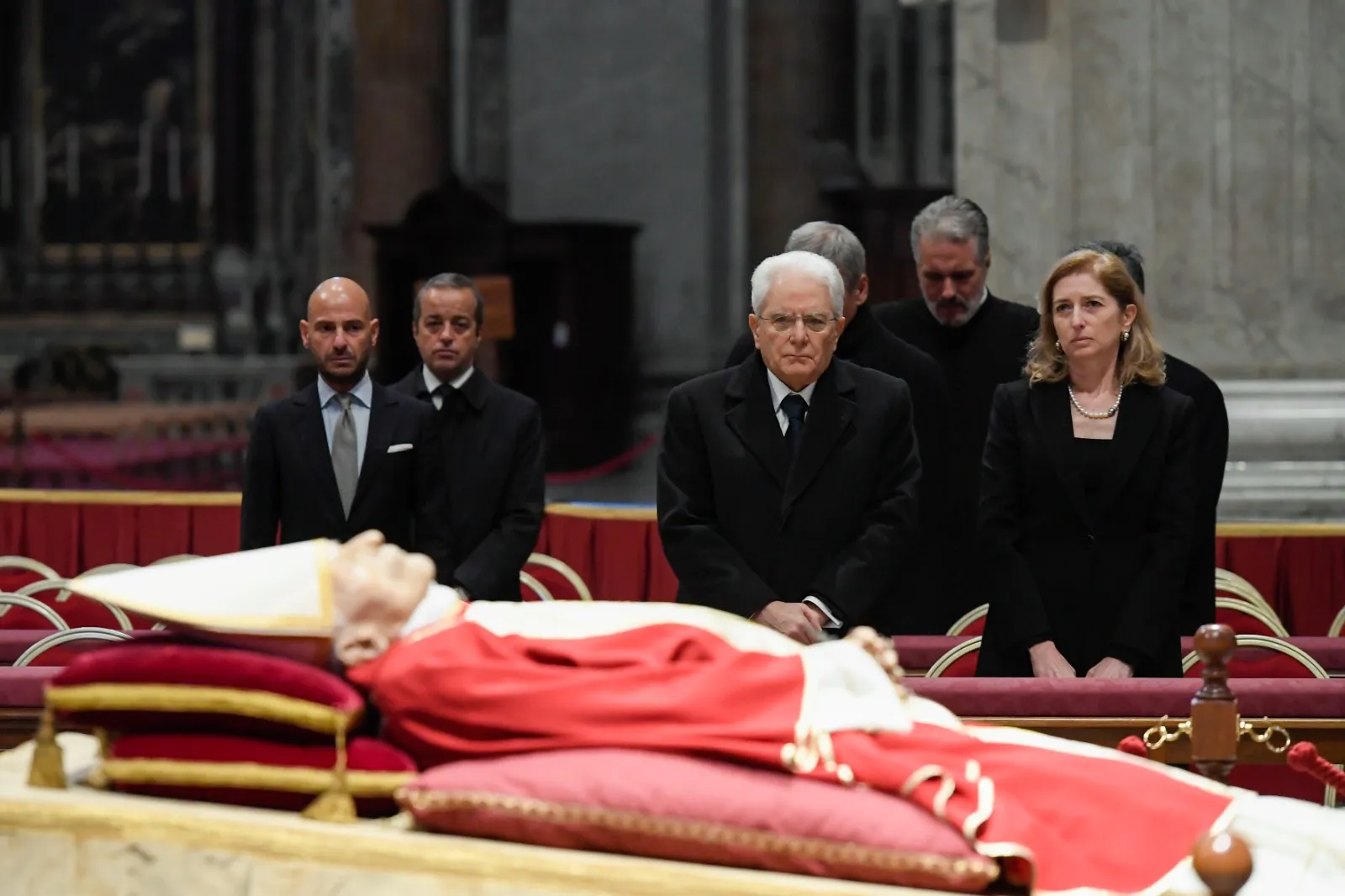
Rome Newsroom, Aug 3, 2020 / 03:21 am (CNA).- Pope emeritus Benedict XVI is sick with a bacterial infection and “very frail,” according to a German newspaper report.
Citing Benedict biographer Peter Seewald, German newspaper Passauer Neue Presse (PNP) reported Aug. 3 that the 93-year-old pope emeritus is suffering from facial erysipelas, a bacterial infection of the skin which causes a painful, red rash.
The infection can also result in fever, headaches, and lymphedema. It is treated with antibiotics.
Seewald told PNP that Benedict has been “very frail” since his return from visiting his ailing older brother, Msgr. Georg Ratzinger, in Bavaria in June. Georg Ratzinger died July 1.
Seewald saw Benedict XVI at his Vatican home in the Mater Ecclesia monastery Aug. 1 to present him with a copy of his latest biography of the retired pope.
The journalist said despite his illness, Benedict was optimistic and stated he might take up writing again if his strength returns. Seewald also said the former pope’s voice is now “barely audible.”
PNP also reported Aug. 3 that Benedict has chosen to be buried in the former tomb of St. John Paul II in the crypt of St. Peter’s Basilica. The body of the Polish pope was moved into the upper part of the basilica when he was canonized in 2014.
Like John Paul II, Benedict XVI has written a spiritual testament which can be published after his death.
Benedict XVI resigned from the papacy in 2013, citing advanced age and declining strength that made it difficult to carry out his ministry. He was the first pope to resign in nearly 600 years.
In a letter published in an Italian newspaper in February 2018, Benedict said, “I can only say that at the end of a slow decline in physical strength, inwardly I am on pilgrimage home.”
If you value the news and views Catholic World Report provides, please consider donating to support our efforts. Your contribution will help us continue to make CWR available to all readers worldwide for free, without a subscription. Thank you for your generosity!
Click here for more information on donating to CWR. Click here to sign up for our newsletter.





Peter Seewald has developed an intimacy with Benedict apparent in his interviews, and book. His judgment should be trusted. If our blessed loved Benedict XVI departs he’ll remain an advocate. Of course his final testament will be interesting. A true and faithful witness I’m confident he will be rewarded with beatific knowledge of his beloved Jesus of Nazareth. It will end the moot controversy of who is pope. The contrast with Francis is remarkable. Nowhere do we find in Benedict since his spiritual maturity any ambiguity, any preposterous suggestion, any abrogation as pontiff in witnessing to and defending the faith as revealed. Unlike our present experience. I refuse to judge Pope Francis because I am not equipped to do so. God is the judge of his conscience. No one is equipped to accompany and discern the truth of a person’s soul. Nonetheless I can and must pass judgment on a person’s works. There I address with full confidence that there are deceptive features, said in passive tense not active as one intending to deceive. For example Pope Francis in Amoris Laetitia 303 quotes Saint Thomas Aquinas in ST 1a2ae 94 4, Although there is necessity in the general principles, the more we descend to matters of detail, the more frequently we encounter defects. Aquinas addresses Justice in this passage to emphasize the need to deliberate the conditions on the ground so to speak in determining what is just. He’s posing a hypothetical to demonstrate a point, not that we can never determine what is just – if for example we take it literally that we will always find exceptions. Instead Francis proposes that we will always find exceptions to an intrinsically evil act like Adultery [or abortion, homosexuality, cohabitation] which demolishes the reality of intrinsic evil. Aquinas holds there is no virtuous mean between excess and defect for such an evil. Murder, abortion, homosexuality are always evil. Consequently Francis underscores a doctrine of mitigation that affects all morality leaving culpability indeterminate and subject to discernment and resolution. He references in 302 the Catechism that mitigation may reduce to a minimum moral culpability (Catechism of the Catholic Church, no. 2352). Mitigation cannot become a theological category that eliminates mortal sin as warned by John Paul II. Especially if we remain in a continuous state of repeated intrinsically evil acts, as if the serial fornicator, adulterer, sexual deviant diminishes culpability, is even freed from mortal sin. Insofar as abortion the overwhelming majority are convenience decisions, rarely under extreme conditions of duress. Mitigation as employed by the Pope Francis places personal conscience as the determinant of what is a moral good or evil. Indeterminate moral standards due to exceptions, mitigation, and conscience are the three levers that overturn traditional Apostolic morality, a first in Church history and a deceptive doctrine he commends to all clergy to employ by accompaniment and discernment. Thereby placing the onus on the priest to grant the benefit of the doubt. As in Malta tacitly approved by this Vatican that anyone may now approach the sacraments at will regardless of manifest sin, with the proviso they follow the guidelines, the three levers of deliberation and dissolution of culpability provided in Amoris Laetitia. I submit this commentary in conscience as priest and my obligatory witness to the truth.
Does possibly mitigated subjective culpability ever elevate conscience as the determinant of what is moral good or evil, or eliminate objective morality? Pope Benedict wrote directly and unambiguously to this point, and to the widespread deadening of conscience in the West:
“I have been absolutely certain that there is something wrong with the theory of the justifying force of the subjective conscience . . . Hitler may have had none (guilt feelings); nor may Himmler or Stalin. Mafia bosses may have none, but it is more likely that they have merely suppressed their awareness of the skeletons in their closets. And the aborted guilt feelings . . . Everyone needs guilt feelings. The loss of the ability to see one’s guilt, the falling silent of conscience in so many areas, is a more dangerous illness of the soul than guilt that is recognized as guilt (see Psalm 19:12). [‘But who can discern their own errors? Forgive my hidden faults.’]
“To identify conscience with a superficial state of conviction is to equate it with a certainty that merely seems rational, a certainty woven from self-righteousness, conformism, and intellectual laziness. Conscience is degraded to a mechanism that produces excuses for one’s conduct, although in reality conscience is meant to make the subject transparent to the divine, thereby revealing man’s authentic dignity and greatness” (Values in a Time of Upheaval, 2006).